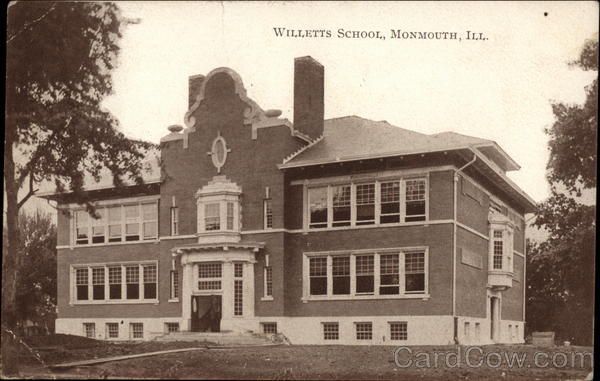MONMOUTH SCHOOL’S NAMESAKE GOT LITTLE RESPECT
When Elias Willits died in 1881 at the age of 55, he was a respected Monmouth attorney, who had served as county judge since 1870. A former secretary of the school board, he was honored nine years later when the old West Ward School (which stood on the current site of Monmouth-Roseville High School) was named in his memory.
In 1907, Willits’s legacy was extended when a new elementary school bearing his name was erected on West Broadway. There was only one problem—the stonemason who carved his name over the front entrance spelled Willits with two “Ts.” Although Willits was long dead, his widow, Elizabeth, would live another 16 years, so the misspelling likely remained a sore subject for her and her children. To make matters worse, the official Warren County history, published in 1927, spells the name of the school “Willets.”
When a major addition to the school was contemplated in 1953, the school board was faced with the dilemma of how to spell the name on the new building. Rather than having one part of the school named “Willitts” and another part spelled “Willits,” the board in its wisdom decided to perpetuate the earlier error and spell the new addition with an extra T.
The 1953 addition, which was the result of a vote to issue $120,000 in bonds, reflected the first wave of Baby Boomers reaching school age. In that year, Monmouth faced the daunting task of placing more than 1,200 first-graders in classrooms. A new boundary was established to allow Willits to absorb some of the students from the Garfield district, giving it a total of 262 pupils.
Built on the west side of the 1907 school, the addition consisted of four new classrooms, and was completed over Christmas break, after the kitchen and PTA rooms had been used for classes that fall.
The reconfigured Willits School served admirably for two decades, until voters approved a $2.1 million building program for District 38 in 1970. That initiative resulted in entirely new buildings for Harding and Garfield schools, as well as remodeling and enlarging of Lincoln, Central Junior High and Monmouth High School. Willits would be added to the list in 1974.
A new trend in elementary schools was the construction of all-purpose rooms, which could be used for recreation, but which were primarily designed to allow the serving of student lunches. Previously, only Central Junior High had a closed lunch program, but in 1974, the original Willits School was razed to make way for the addition of an all-purpose room and the beginning of a lunch program.
By the late 1970s, the Baby Boom had run its course and the number of elementary school students began a steady decline. As the 21st century dawned, it became clear that Monmouth could no longer support four elementary schools. Progressive educators pushed for an education center model, in which first- through sixth-graders would be split among multiple locations based on age. In 2010, it was decided that Willits would be retired as an elementary school and converted to a district office.
Generations of former Willits students were saddened by the closing, but very few had any knowledge of the man behind the name of their beloved school.
Elias Willits was born in Wayne County, Indiana, in 1826, and journeyed to Mercer County in 1851, where he became a partner in a law firm at Keithsburg. In 1862, he moved his practice to Monmouth, and in 1870 was elected to fill the unexpired term of the Warren County judge. He was reelected twice, but in 1881, he contracted a lingering illness, which led to his death on Nov. 1. He and his wife were members of the Swedenborgian Society, which followed the precepts of 18th-century Swiss theologian and mystic Emanuel Swedenborg. Willits funeral was conducted by a Swedenborgian minister from Chicago.
The Willits had seven children, only three of whom lived to adulthood, but their daughter Anna would become a nationally known figure as one of six founders of Kappa Kappa Gamma women’s fraternity in 1870. In the year of her father’s death, Anna married the wealthy Monmouth plow maker Henry Pattee and became a fixture in Monmouth society. She died following surgery in 1908.
For Maple City Memories, I’m Jeff Rankin.














